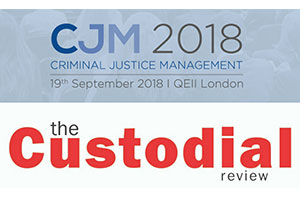
The 18th Criminal Justice Management Conference is a national event bringing together over 300 professionals in prison and probation services alongside police, central government and courts who, together, have a joint responsibility to shape current reform and the future direction of policy in the criminal justice system.
To secure your place while availability lasts, please visit www.cjm-conference.co.uk/registration and quote ‘CUST100’ on the booking page to receive £100 off.

One of the facilitators for social enterprise Beyond Recovery staged his second solo art exhibition in the Noho Studios, Fitzrovia, London, recently. Artist Paul Lock featured incredible portraits of three of the men with whom Beyond Recovery has worked in prison and have since been released. Now Beyond Recovery apprentices, the men attended a private viewing of the exhibition – ‘You Simply Are II’ – on 24th September along with family and friends, including the Beyond Recovery team.

After more than four years delivering its insight-based programme to men in prison, Beyond Recovery started working with HMP Nottingham in March 2019. The team was asked to assist in the development of the prison's Incentivised Substance Free Living (ISFL) wing, by providing support to the men living there. David Kowitz, philanthropist, generously provided funding for Beyond Recovery to deliver their programme in Nottingham prison.

Jacqueline A (Bennett) Hollows MSc is the founder of Beyond Recovery CIC – an organisation working in the CJS with an innovative Freedom of Mind programme which has been evidenced and had a profound impact over the last five years. Here, she tells the story of what happened in one of her groups when a previous graduate died of a drug overdose…
Mind Beyond Bars #01-19– Charlie’s story
You get to hear and all sorts of things when running groups for inmates in prison. All of humanity turns up in these rooms. Gritty stories of hardship and wrongdoing, traumatic stories of lives damaged, stories of hope and change, and stories of pain and suffering.

Jacqueline Hollows, the founder of Beyond Recovery CIC, discusses with The Custodial Review why she set up a social enterprise dedicated to helping prisoners realise their true potential…
Mental health and addiction Q&A
When was Beyond Recovery set up, and what was the driving force behind it?
Beyond Recovery was created as a social enterprise in February 2015 after I had a defining moment of realisation where I saw that the way addiction and mental health are treated and viewed need to be radically changed.
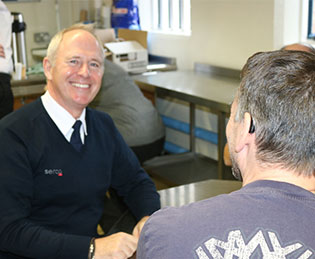
Serco announces that it has signed up to the national ‘Ban the Box’ campaign from Business in the Community (BitC), which is creating a fair chance for ex-offenders to compete for jobs and bringing down the £15 billion a year cost of reoffending.
In signing up to the campaign, Serco has agreed to ban the tick box from job application forms asking about unspent criminal convictions across its UK operations and has committed to considering applicants’ skills, experience and ability to do the job before asking about criminal convictions. This means that candidates with a criminal record can now apply for jobs with Serco with the knowledge that they will be assessed on their ability to do the job before any convictions are fairly considered.
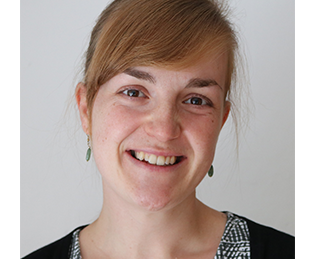
Rosie Hart, the director of Kairos Women Working Together, discusses with the Custodial Review the work which the small Coventry charity does to support women prisoners at risk of exploitation, including women in prostitution.
Could you outline the work you do with women in prisons?
Kairos Women Working Together (KairosWWT) is a grassroots charity in Coventry supporting women at risk of sexual exploitation, including those caught up in prostitution. We meet our service users through outreach and drop-in sessions that we run, as well as receiving referrals from probation services, prisons that know of our work and from other partner agencies locally.
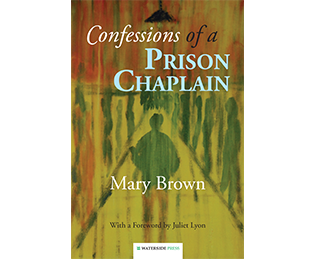
Waterside Press are giving away a copy of Confessions of a Prison Chaplain by Mary Brown and Opening the Doors: A Prison Chaplain’s Life on the Inside by Paul Gill in a prize worth over £30. Here, Bryan Gibson writes about the titles which follow the authors' work…
A stereotype image of the prison chaplain is perhaps of a ‘meddling do-gooder’ who can embarrass hardened inmates by talking to them as if they are children. Someone ‘born yesterday’ who is distant, easy to con, wears a ‘dog-collar’ or beads, is not from the establishment concerned, and who pops up now and again with a kindly smile on his face (unlike the guards).
But modern chaplains are not like that – and they can be a real ‘safety valve’ and outside link. Nowadays they are likely to be from one of a number of faiths (or even none), part of a team – including women – dedicated to a non-judgmental approach. They are a central component in diffusing tensions, reducing re-offending and helping offenders to change (or rescue) heart, mind and even life. If this sounds pompous it’s the nature of the work!

Tim Tate is an author, investigative journalist and filmmaker who worker with the late Ray Wyre – a pioneer in treatment of child sex offenders. Here, Tim describes how Ray’s work challenged the lack of rehabilitation options for paedophiles and asks if the current system is doing enough to protect children from abuse…
For someone whose work would become so influential, Ray Wyre’s introduction to sex offenders was surprisingly accidental.
In 1981, three years after joining the Probation Service, he was transferred to Albany, the high security facility on the Isle of Wight: here, by chance, he was assigned to the E Wing, which then housed 36 sex offenders in segregation from the rest of the prison’s population.
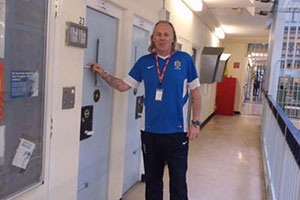
The Custodial Review editor Victoria Galligan spoke to Pete Bell, the founder of the Step Out Stay Out programme within prisons. Here, Pete describes how sport turned his life around and set him on a path to help others to rehabilitate…
Pete Bell isn’t just a football coach. He is also a mentor to the inmates he works with and can empathise with them as he has spent time in prison on the other side of the cell door.
From 1990, Pete served time in the Criminal Justice System and says, “I racked up 10 convictions, I was drinking heavily and had been through a custody battle – and then my son passed away. He was two.
“What turned things around for me was when I faced my final sentence five weeks after my son died – I was expecting to get around five years in prison.
“But the judge’s humility towards me meant that he could see that sending me to prison was not right for me.”
